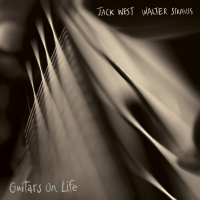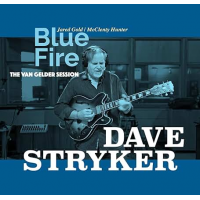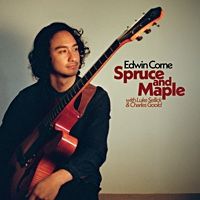Home » Jazz Articles » Album Review » Alexander Hawkins: Song Unconditional
Alexander Hawkins: Song Unconditional
Since that initial unaccompanied foray, Hawkins has become one of the most in demand voices in modern improvised music. A valued colleague of Anthony Braxton, Joe McPhee, Nicole Mitchell, and Evan Parker, among others, he draws from an expansive range—both his encyclopedic command of the jazz canon and deep affinity for classical idioms inform a technique that is as rigorous as it is imaginative. The material stems from a lockdown-era correspondence with regular collaborator cellist {[Tomeka Reid}}, in which the pair challenged one another to compose a piece daily for 100 days. Hawkins' notebooks from that time hold the genesis of these 13 short cuts which retain the vim and vigor of the best extemporizations.
Just because Hawkins is alone in the studio does not mean that he has to abandon the layerings and juxtapositions which are a feature of so many of his ensembles. His prodigious hand independence keeps multiple plates spinning -as lines part company, run parallel or intersect, sometimes clashing, sometimes coalescing into unexpected structures. On "Two Trees Equal," this contrapuntal thinking takes center stage, a high-velocity exchange that teeters between dialogue and divergence. "Song of Interdependence" recalls the astringent lyricism of early Keith Jarrett filtered through the player piano works of Conlon Nancarrow, evoking a kinetic, breathless momentum.
Melodies here tend to be elusive and fragmentary, but Hawkins knows how to make them linger. "Satin Antiphonal" introduces one of the album's most arresting motifs: clipped upper-register figures sparring with a jabbing, low-end pulse, thickening in texture as it moves toward a richly sonorous close. Nonetheless, "Song of Balance" stands as the clearest homage to the lineage of Duke Ellington and Thelonious Monk.
Many numbers unfold into self-contained sound worlds. There is little conventional resolution in Song Unconditional, but Hawkins never aims for closure. Instead, he favors a modular approach, crafting miniatures that hover, suggesting more than they declare. The final track, "Song of a Quiet Ecstatic," gestures toward leave-taking, but with a provisional feel—an ending that doubles as an invitation.
In his most personal solo offering to date, Hawkins does not just straddle the line between improvisation and composition—he renders it moot. The result is a compelling suite that reveals itself with a sense of intricate, evolving possibility.
Track Listing
Polyphonic Song; Her Heart Carries Gold to Match Her Eyes; Song of Infinite Variations; Song Bewildered; Satin Antiphonal; Song Symmetrical; Two Trees Equal; Song of Balance; Crinkle, Crinkle; Song of Work Still To Do; Song of Interdependence; Song in Orbit; Song of a Quiet Ecstatic.
Personnel
Alexander Hawkins
pianoAdditional Instrumentation
Alexander Hawkins: piano
Album information
Title: Song Unconditional | Year Released: 2025 | Record Label: Intakt
Tags
PREVIOUS / NEXT
Alexander Hawkins Concerts
Support All About Jazz
 All About Jazz has been a pillar of jazz since 1995, championing it as an art form and, more importantly, supporting the musicians who make it. Our enduring commitment has made "AAJ" one of the most culturally important websites of its kind, read by hundreds of thousands of fans, musicians and industry figures every month.
All About Jazz has been a pillar of jazz since 1995, championing it as an art form and, more importantly, supporting the musicians who make it. Our enduring commitment has made "AAJ" one of the most culturally important websites of its kind, read by hundreds of thousands of fans, musicians and industry figures every month.
























